In the UAE, the year 2071 carries special significance, it marks 100 years since the nation’s founding and serves as a target for ambitious development goals under the UAE Centennial Plan 2071. Area 2071 is a bold initiative created as a physical and conceptual platform to drive the country toward that centennial vision. Launched in Dubai by His Highness Sheikh Mohammed bin Rashid Al Maktoum in 2017, Area 2071 is designed as a hub where innovators, government agencies, and global partners converge to imagine and build the future. It is housed at the Emirates Towers in Dubai, symbolically at the heart of the city’s future-focused district. In the words of Sheikh Mohammed, “Area 2071 reflects the UAE’s ambition to be a key player in building the future. It is an open laboratory to learn, develop ideas and experiences, and design the future, as well [as] drafting a better future for humanity.” This ethos captures the UAE’s drive to become one of the world’s most advanced nations by 2071, with innovation as its engine.
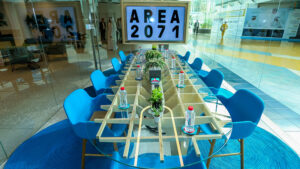
Vision and Role in the Innovation Ecosystem
Area 2071 is a “physical manifestation” of the UAE’s innovation drive, intended to make Dubai a world-leading city for transformative ideas with positive global impact. It serves as a co-creation ecosystem bringing together startups, established companies, government bodies, and the wider community. Unlike organic tech clusters such as Silicon Valley, which evolved over decades, Area 2071 is a deliberately designed innovation environment aligning with national strategy. The space hosts entrepreneurs “Residents”, government and corporate partners “Hosts”, and the public “Guests” in a fluid environment meant to encourage serendipitous collaboration. In practice, this means a startup founder in Area 2071 might find themselves working alongside a government ministry team or a multinational tech company on solving a shared challenge. This collaborative model is comparable to other global innovation hubs like Station F in Paris, which houses startups alongside corporate and public sector programs in one campus. Area 2071’s intentional design as a melting pot for diverse talents echoes a broader trend: from Singapore to Shenzhen, new innovation hubs are emerging with distinct models that go beyond replicating Silicon Valley. The UAE’s approach is to build a homegrown ecosystem tailored to its strengths, leveraging public-private partnerships, a future-oriented culture, and significant government support, in order to position Dubai as a global innovation leader.
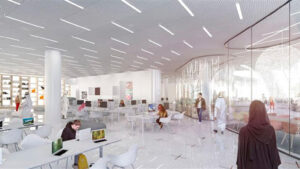
Policy Innovation and Government Initiatives
One of the defining features of Area 2071 is its close integration with government strategy and policy innovation. The initiative was born out of the UAE government’s recognition that future governance and innovation must go hand in hand. In fact, Area 2071’s name itself is derived from the UAE Centennial Vision 2071, a long-term government plan to make the UAE among the world’s best countries by its 100th anniversary. To achieve this, the UAE government uses Area 2071 as a testbed for new policies and regulatory frameworks that support cutting-edge industries. For example, Area 2071 hosts the UAE’s Regulations Lab (RegLab), a regulatory sandbox where lawmakers collaborate with innovators to draft and pilot new legislation for emerging technologies. This allows startups in fields like fintech, AI, or autonomous vehicles to obtain special licenses and operate in a controlled environment while appropriate laws are being developed, ensuring policy keeps pace with innovation. Such an approach is comparable to initiatives in other forward-looking nations (for instance, Singapore’s regulatory sandboxes or the UK’s fintech sandbox), but the UAE has extended it across multiple sectors via RegLab, illustrating how Area 2071 functions as a policy laboratory for the future. The government has also co-located key programs in Area 2071, such as the UAE Government Accelerators (launched in 2016 to speed up public-sector solutions) and the Dubai Future Accelerators (which pairs global startups with government entities). By bringing these initiatives under one roof, Area 2071 serves as an “umbrella” unifying efforts to tackle national challenges through innovation. This alignment of government and innovators is quite unique; it creates a feedback loop where policy informs technology development and vice versa. As His Excellency Mohammed Al Gergawi, UAE Minister of Cabinet Affairs and a key architect of Area 2071, observed, such visionary initiatives are part of a governance model where “the Foundation will continue to provide global platforms to share knowledge, expertise, [and] visions… and enable the deployment of disruptive [technologies] to better serve humanity.” By actively guiding and supporting the innovation ecosystem through Area 2071, the UAE government is not only fostering new industries but also redefining how governments can proactively “design the future” alongside the private sector.
Social Impact and Community Engagement
Beyond economic and technological goals, Area 2071 places strong emphasis on social impact and inclusivity. The project’s long-term vision is ultimately about improving quality of life and human wellbeing, a principle woven into the Centennial Plan and the rhetoric of leaders. In practical terms, Area 2071 is open and accessible: many of its events, workshops, and spaces are available to the broader public to spark a culture of innovation in the community. Students, creatives, and citizens can participate in hackathons, attend talks by experts, or simply use co-working facilities to develop their ideas. By demystifying technology and entrepreneurship for the general public, Area 2071 helps cultivate an innovation mindset among the youth, a crucial aim since the Centennial Vision “invests in UAE youth” to carry forward the nation’s development. The Youth Hub at Area 2071 is one example: it’s a dedicated space for people under 35 to work, learn new skills, and collaborate on projects. Such investment in youth echoes initiatives in other countries (for instance, France’s Station F has programs to include entrepreneurs from underprivileged backgrounds), highlighting a common understanding that the innovators of tomorrow must be empowered today. Area 2071 also fosters social innovation by hosting challenges in sectors like health, education, and sustainability, issues that directly affect society. By bringing together NGOs, government departments, and startups, the hub generates innovative solutions for community problems. This aligns with Area 2071’s motto of serving humanity; any breakthrough in these domains stands to benefit not only the UAE’s residents but potentially the world. In short, the social impact of Area 2071 is twofold: it nurtures an inclusive community of future leaders and it channels inventive energy toward the public good.
Economic Development and Global Partnerships
Central to Area 2071’s mission is positioning the UAE’s economy for a post-oil, knowledge-based future. The hub functions as an economic catalyst, supporting entrepreneurs and new industries that diversify the economy and drive productivity growth. Startups nurtured in Area 2071 span vital sectors such as artificial intelligence, renewable energy, transportation, fintech, and space technology, all sectors earmarked to power the UAE’s next 50 years of development. By providing state-of-the-art labs, mentorship, and even startup business licenses on-site, Area 2071 lowers barriers to entry for new businesses. This model parallels other global innovation centers; for example, Singapore’s one-north and Fusionopolis hubs provide infrastructure and networking for tech companies, and cities like Bangalore or Tel Aviv have grown by concentrating talent and capital in innovation zones. What sets Area 2071 apart, however, is the scale of its global partnerships orchestrated from day one. At the launch, the UAE government signed 12 Memoranda of Understanding with major international and local entities to collaborate at Area 2071 across 11 key sectors. Partners included the United Nations, Fortune 500 companies like IBM and Pfizer, professional services like Ernst & Young, as well as local innovators and venture capital firms. This broad coalition of expertise illustrates a strategy to import knowledge and export innovation: global companies and institutions work alongside Emirati startups and agencies to solve problems, and successful solutions can be scaled out from the UAE to the world. By acting as a bridge between global innovation networks and the emerging Middle East tech scene, Area 2071 boosts Dubai’s soft power and economic opportunities. It’s akin to how Dubai’s logistics and finance sectors grew by interfacing East and West; now the same is happening with technology and entrepreneurship. Already, Area 2071 has incubated projects in aviation, blockchain, smart cities, and more, often in collaboration with its international partners. The economic impact of these efforts is expected to accumulate over time as startups mature into new employers and industries. Much like how Silicon Valley’s cluster of companies became a backbone of the US economy, Dubai is aiming for its innovation hub to drive significant GDP contribution and high-skill job creation in the long run. The presence of venture capital (e.g. Wamda Capital) and accelerators in Area 2071 also helps channel investment into promising ventures, ensuring that economic growth from innovation is sustained.
Area 2071 represents a pioneering model in the global landscape of innovation hubs, one that intertwines a bold national vision with grassroots ingenuity. It plays multiple roles: a creative coworking space, a policy experimentation zone, a community center, and an economic incubator. For the general public, it stands as a symbol that the future isn’t something that just “happens” to a country, but something that a country can actively design. The UAE’s leadership often emphasizes that designing the future is a collective effort involving government, private sector, and society. Nowhere is this more evident than at Area 2071, where that collaboration is made concrete. The initiative also underscores how countries like the UAE are charting their own paths in the innovation race. While taking inspiration from successful ecosystems around the world, the UAE is integrating its unique cultural and policy context, much as other rising hubs globally are doing in a “new geography of innovation” era. As 2071 draws closer with each passing year, Area 2071 will likely continue to evolve, measuring success not just in startup valuations or patents filed, but in how it contributes to a happier, more prosperous society. By uniting vision with execution, and local talent with global expertise, Area 2071 encapsulates the UAE’s forward-looking spirit. In the words of Sheikh Mohammed bin Rashid, the project is indeed a “bridge to the future”, one that the nation and its partners are collectively building, step by step, toward the centennial horizon.


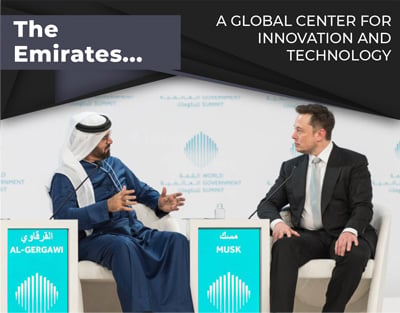
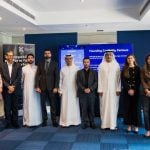
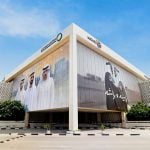
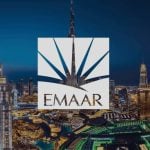
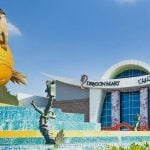
Leave a Reply